-
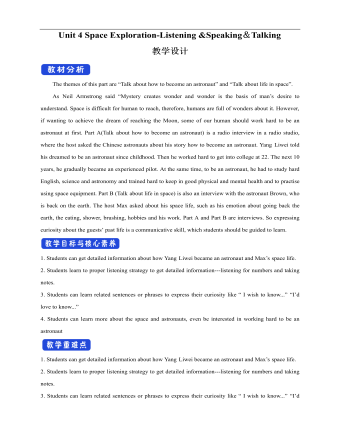
新人教版高中英语必修3Unit 4 Space Exploration-Listening&Speaking&Talking教学设计二
The themes of this part are “Talk about how to become an astronaut” and “Talk about life in space”. As Neil Armstrong said “Mystery creates wonder and wonder is the basis of man’s desire to understand. Space is difficult for human to reach, therefore, humans are full of wonders about it. However, if wanting to achieve the dream of reaching the Moon, some of our human should work hard to be an astronaut at first. Part A(Talk about how to become an astronaut) is a radio interview in a radio studio, where the host asked the Chinese astronauts about his story how to become an astronaut. Yang Liwei told his dreamed to be an astronaut since childhood. Then he worked hard to get into college at 22. The next 10 years, he gradually became an experienced pilot. At the same time, to be an astronaut, he had to study hard English, science and astronomy and trained hard to keep in good physical and mental health and to practise using space equipment. Part B (Talk about life in space) is also an interview with the astronaut Brown, who is back on the earth. The host Max asked about his space life, such as his emotion about going back the earth, the eating, shower, brushing, hobbies and his work. Part A and Part B are interviews. So expressing curiosity about the guests’ past life is a communicative skill, which students should be guided to learn.1. Students can get detailed information about how Yang Liwei became an astronaut and Max’s space life.2. Students learn to proper listening strategy to get detailed information---listening for numbers and taking notes.3. Students can learn related sentences or phrases to express their curiosity like “ I wish to know...” “I’d love to know...”4. Students can learn more about the space and astronauts, even be interested in working hard to be an astronaut
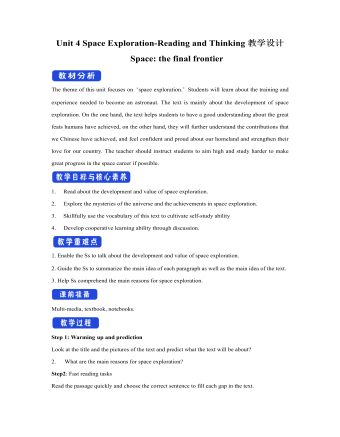
新人教版高中英语必修3Unit 4 Space Exploration-Reading and Thinking教学设计二
The theme of this unit focuses on “space exploration.” Students will learn about the training and experience needed to become an astronaut. The text is mainly about the development of space exploration. On the one hand, the text helps students to have a good understanding about the great feats humans have achieved, on the other hand, they will further understand the contributions that we Chinese have achieved, and feel confident and proud about our homeland and strengthen their love for our country. The teacher should instruct students to aim high and study harder to make great progress in the space career if possible.1. Read about the development and value of space exploration.2. Explore the mysteries of the universe and the achievements in space exploration.3. Skillfully use the vocabulary of this text to cultivate self-study ability 4. Develop cooperative learning ability through discussion.1. Enable the Ss to talk about the development and value of space exploration.2. Guide the Ss to summarize the main idea of each paragraph as well as the main idea of the text.3. Help Ss comprehend the main reasons for space exploration. Multi-media, textbook, notebooks.Step 1: Warming up and predictionLook at the title and the pictures of the text and predict what the text will be about?2. What are the main reasons for space exploration?
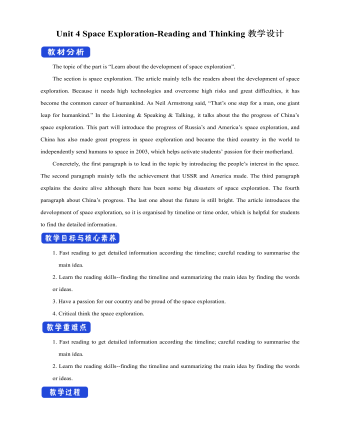
新人教版高中英语必修3Unit 4 Space Exploration-Reading and Thinking教学设计一
Q4: What is the function of the International exploration ?Having astronauts from different countries on boardQ5: What can you learn from Para 4 ?China has made great achievements in exploring spaceQ6: What is the attitude to the space exploration ?SupportiveStep 6 Post reading---RetellPeople have always wanted to learn more about space. Before the mid-20th century, most people felt (1)_________ (travel) into space was an impossible dream. However, (2)____ the help of scientists, peoplesucceeded in realizing their dream (3) _________ (explore) space. On 4 October 1957, the Sputnik 1 satellite (4) ____________(launch) by the USSR. (5) ________________ scientists try to make sure nothing goes wrong, accidents can still happen. These disasters made everyone(6)___________(disappoint), but people still believe in the importance of (7) ________(carry) on space exploration. In 2003, China became the third country to (8)_____________ (independent) send humans into space. Then Shenzhou 6 and 7 completed (9)____ second manned orbit and the first Chinese spacewalk. In spite of the difficulties, scientists hope future (10)__________ (discovery) will not only enable us to understand the universe but also help us survive well into the future.Answers: 1. travelling 2. with 3. to explore 4. was launched 5. Although6. disappointed 7. carrying 8. independently 9. a 10. discoveriesStep 6 Post reading---Critical thinkingQ1: What do you think of the space exploration ? I think it is beneficial to us. Through further study of space, people will make full use of it in the future, such as the space experiments by Wang Yaping in Tian Gong 1.Q2: If you are determined to be an astronaut, what should you prepare at present ?First of all, I should study hard to get a related college degree. Besides, I must keep mental and physical healthy.Step 7. HomeworkTry to summarize the structure of the article by a mind map.
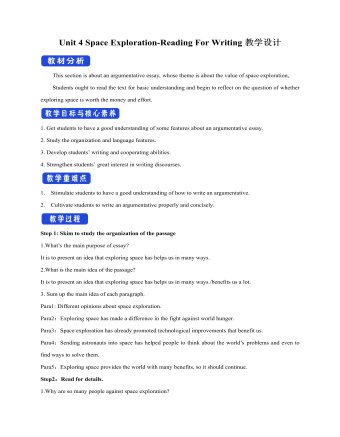
新人教版高中英语必修3Unit 4 Space Exploration-Reading For Writing教学设计一
另一方面,其余的人反对这个计划,因为它可能会导致一些不好的影响。7.I hold the belief that space exploration not only enable us to understand how the universe began but also help us survived well into the future.我坚信探索太空不仅能够使我们了解宇宙的起源而且能够帮助我们更好地走进未来。8.I think we should spend more time and money exploring space so as to provide new and better solutions to people's shortterm and longterm problems.为了给人类的短期和长期问题提供更新和更好的解决方法,我认为我们应该花更多的时间和金钱来探索太空。9.From my point of view,it is wrong of young people to depend on their telephones too much,which may do harm to both their physical and mental health.在我看来,年轻人过度依赖手机是不对的,因为它们可能会对他们的身心健康都有害。最近你班同学就“人类是否应该进行宇宙探索”这个问题进行了激烈的讨论。有人认为,探索宇宙不仅让人类更好地了解宇宙的发展,还可以用来指导农业生产,以及把一些探索太空的高新技术用于现实生活;也有一些人认为探索太空花掉了大量的人力物力;影响了人们的生活水平。请你根据以下情况写一篇报告并发表自己的观点。注意:1.写作内容应包括以上全部要点,可适当发挥,使上下文连贯;
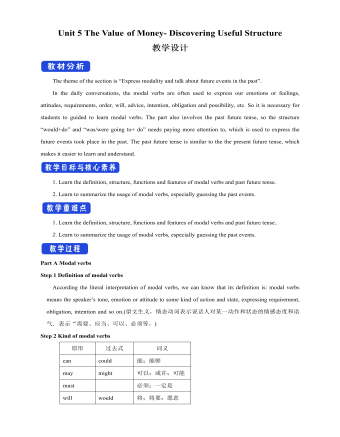
新人教版高中英语必修3Unit 5 The Value of Money- Discovering Useful Structure教学设计
Step 3 Meaning1. 过去将来时表示从过去某一时间来看将要发生的动作或存在的状态, 常用在宾语从句中。一般由“would/should +动词原形”构成。She hoped that they would meet again someday. 她希望将来有一天他们能再见面。2. was/were going to+动词原形: 表示过去将要发生或很有可能发生的动作, 常用于口语中, 表示预言、意图或者打算等。He was going to start work the following week. 他打算下星期开始工作。3. was/were about to do: 常用来表示即将发生的动作, “刚要/正要做……”。注意该结构不与任何时间状语连用。I felt that something terrible was about to happen. 我感到某种可怕的事情即将发生。4.was/were to do: 表示“曾计划做某事”, 如果表示“本来计划做某事, 动作没实现”, 则需用 “was/were to have done”。She said she was to have told me about the accident. 她说她本来想告诉我关于事故的事。5.Start, go, come, leave, see, meet等动词的过去进行时: 表示就过去某一时刻而言即将发生的动作。She was coming later. 她随后就来。I had just put on my overcoat and was leaving to visit a friend of mine. 我刚穿上外套要去看我的一个朋友。
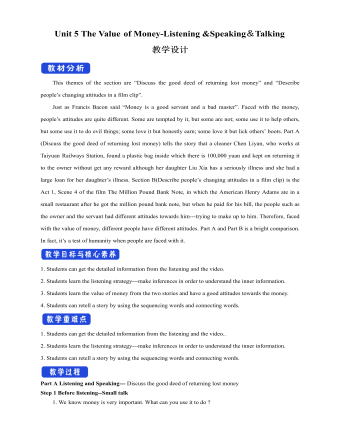
新人教版高中英语必修3Unit 5 The Value of Money-Listening &Speaking&Talking教学设计
4. A:We’d like to have someone to say a word at the beginning to welcome the group.B:↙Who?A:We thought that you or Dr.Johnson might do it.B用降调说Who,其意思是问,对方想让谁在开场时致欢迎词。Step 6 Pronunciation---Practice1. Listen to the short conversation and mark the intonation with ↗, ↙ or ↙, ↗. Then discuss with a partner what they intend to convey by using different intonation.Owner: You know what ?↗ It’s a million-pound bank note↙.Waiter 1: Really ?↗(question)Waiter 2: Really !↙(unbelievable and surprised)Waiter 3: Really ?!↙↗(first question then surprised)2. Listen to the conversations. Underline the parts that are stressed and mark the intonation. Then talk about the implied meanings of the responses with different intonations. Listen again and repeat.1) Henry: It’s a nice suit.Owner: Oh, it’s perfect!↙(The intonation means it is very suitable for Henry.)2) Henry: Well, that’s very kind of you.Owner: Kind, sir ?↗(what you said is not right) No, it’s kind of you. You must come whenever you want and have whatever you like. Just having you sit here is a great honour !!↙(welcome you to come again)3)Henry:Well, to be honest, I have none. Oliver:(happily) What luck!(excited) Brother↗, what luck!↙(It means “Didn’t you hear it?”)Henry: Well, it may seem lucky to you but not to me!↗(angry) If this is your idea of some kind of joke, I don’t think it’s very funny. Now if you’ll excuse me, I ought to be on my way.↙(If so, I would leave.)Roderick: Please don’t go↙...(hope Henry can wait for a moment)Part B Viewing and Talking---Describe people’s changing attitudes in a film clipStep 1 Before-listening---Tell the filmYou are going to watch part of the film The Million Pound Bank Note. Look at these photos and guess what happens in the film.
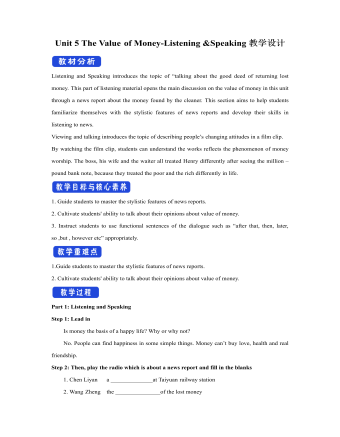
新人教版高中英语必修3Unit 5 The Value of Money-Listening &Speaking教学设计
Step 4: Listen again and decide if the following statements are true (T) or false (F).1 It was the first time Chen Liyan's story was reported. T口 F口2 Chen found 10,000 yuan in a small plastic bag in Taiyuan railway station口 F口3 Wang Zheng apologized to Chen because he couldn't offer her more money. T口 F口4 Chen took out a large loan to cure her daughter, T口 F口5 Wang set up a fundraising website for Chen's daughter after Chen told him about her situation. T口 F口Step 5:After listening, discuss the questions.1 What kind of person do you think Chen Liyan is?Chen Liyan is generous and honest because she returned a large sum of money to the owner.2 Did Chen return the money because she didn't need it?No. She returned the money because it was the right thing to do. Evidence for this is that she refused to accept the reward money because she felt that it had not been earned. 3 Is it common for people to do what Chen did?It depends on the culture. In some countries it is quite common to return money that has been found. In other countries, people believe "Finders are keepers!" 4 How did Wang Zheng feel about the return of his money?He must have been very happy and relieved to have gotten his money back. We know this because he thanked Chen repeatedly and even offered her a reward.5 Why did Ma Dongbao tell Wang about Chen's family?He must have had great sympathy for Chen and her daughter and wanted to help them.'We know this because he arranged help for them. 6 How did the news reporter feel about Chen's actions?The news reporter felt that it showed that money wasn't the most important thing in life. We know this because the reporter told us that this is what Chen believes. and then said, “that's a great attitude to take."
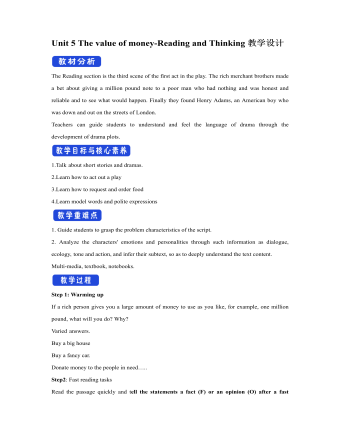
新人教版高中英语必修3Unit 5 The value of money-Reading and Thinking教学设计二
? Could you offer me some kind of work here?? I don’t want your charity, I just want an honest job.? Careless: I landed in Britain by accident.Step 7:Consolidation.? Find Henry? Roderick and Oliver were I .making a bet when they saw Henry, a poor young man. ? Know Henry? About a month ago, Henry was sailing and later he found himself carried out to sea by a strong wind. Fortunately, he 2.was spotted by a ship. And it was the ship that brought him to 3.England? Offer money to Henry ? Oliver and Roderick gave Henry a letter and told him that there was money in it. They 4.persuaded him to accept it, and made him 5.promise that it wouldn't be opened until 2 o'clock.Step 8:Language pointsa large amount of: a large quantity of; a great deal ofe.g. They bought a large amount of furniture before they moved their new house.make a bet: make an arrangement to risk money, etc. on an event of which the result is doubtful.e.g. We made a bet on the result of the match.permit sb to do something: allow somebody to do somethinge.g. My mother doesn’t permit me to ride in the street after it rained.by accident: as a result of chancee.g. I only found it by accident.stare at: look at somebody or something with the eyes wide open in a fixed gaze( in astonishment, wonder, fear, etc)to be honest: to tell you the truth; to be franke.g. To be honest, I don’t think we have a chance of winning.Step7 Homework:What do you think will happen to Henry? Will the bank-note help him or get him into trouble?
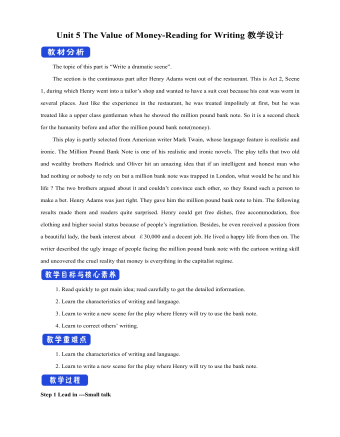
新人教版高中英语必修3Unit 5 The Value of Money-Reading for Writing教学设计二
2. 您能看到, 我头发太长了。You can see that my hair is much too long.3. 无论什么时候, 只要您想回来就回来。Please come back whenever you want.4. 您仅有很少的头发要理! You only have too little hair to cut !5. 为您服务是我的荣幸!It is my honour to serve you!Step 9 Writing(Henry is walking down the street when he sees a sign for a place that cuts hair. He decides to have it cut. )H=Henry B=BarberH: Good afternoon, I’d like to have my hair cut, if I may. (The barber looks at Henry’s hair and continues cutting another man’s hair. ) Er, I’d really like a haircut. As you can see it’s much too long. B: (in a rude manner) Yes, I can see that. Indeed, I can. H: Fine, well, I’ll have a seat then. (He sits in one of the barber’s chairs. The barber turns to look at Henry. )B: It’s quite expensive here, you know! Are you sure you can afford it?H: Yes. I think so. (After his hair is cut, the barber tells Henry how much he must pay. Henry shows the barber the bank note. )B: Why Mr. . . (looks shocked)H: Adams. Henry Adams. I’m sorry. I don’t have any change. B: Please don’t worry! (wearing a big smile) Nothing to worry about! Nothing at all! Please come back whenever you want, even if you only have too little hair to cut! It will be my honour to serve you!Step 10 Pair workExchange drafts with a partner. Use this checklist to help your partner revise his/her draft.1. Are all the elements of a play included and in good order ?2. Do the character use suitable language ?3. Are the stage directions clear and useful ?4. Is the plot clear and exciting enough ?
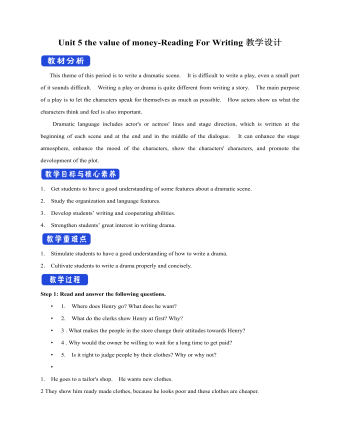
新人教版高中英语必修3Unit 5 the value of money-Reading For Writing教学设计一
【参考范文】Narrator:(Henry is smiling as he leaves the restaurant. As he is walking down the street, he sees a sign for a place that cuts hair. He decides to get it cut. )H=Henry;B=Barber;R=rude manH:Good afternoon, I'd like to get a cut, if I may. (The barber looks at Henry's hair and continues cutting another man's hair. )Er, I'd really like a haircut. As you can see it's much too long. B:(in a rude manner) Yes, I can see that. Indeed, I can. H:Fine, well I'll have a seat then. (He sits in one of the barber's chairs. The barber turns to look at Henry. )B:It's quite expensive here, you know!Are you sure you can afford it?H:Yes. I think so. (In comes the rude man. )R:Hey you there. I need a haircut quickly. Can you do me straightaway?B:All right, then, get in the chair and I'll see what I can do. R:Thank you. (sits down in one of the barber's chairs)H:Excuse me, but I was here first. Aren't you going to do my hair first?B:This man's in a hurry. H:Well so am I!I insist that you cut my hair first. B:OK, but I'll have to be quick. This gentleman is waiting. H:Thank you. (They both become quiet. After his hair is cut, the barber tells Henry how much he must pay. Henry shows the barber the bank note. )B:Why, Mr . . . (looks shocked)H:Adams. Henry Adams. I'm sorry, I don't have any change. R:You're that Mr Adams! Well,I'm glad I waited or I might never have known it was you. B:Why, Mr Adams, please don't worry!(wearing a big smile) Nothing to worry about!Nothing at all!Please come back any time, even if you only need too little hairs cut!It will be my honour to serve you!
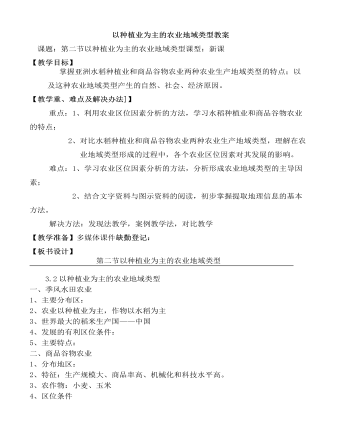
人教版高中地理必修2以种植业为主的农业地域类型教案
1.指导学生阅读“亚洲水稻农业分布示意图”2.指导学生阅读“亚洲气候类型分布图”和“亚洲地形分布图”3.指导学生阅读“亚洲人口分布图”4.提示学生思考:世界主要粮食作物有哪些?水稻种植对气候和土地的要求是什么?东南亚的气候和地形还适宜其他农作物生长吗,为什么不选择?水稻种植对劳动力数量有什么要求?5.引导学生总结本区农业生产的特点。6.引导学生总结季风水田农业的区位因素。7.提醒学生思考:“农业区位的主导因素是自然因素还是社会因素?通过对比商品谷物农业来总结。”(过渡)。列举农业区位因素。画图或示意讲解。阅读示意图,指图说出分布区域。说出水稻分布区的气候类型和气候特点,以及地形特征。说出水稻分布区的人口分布特征。思考并回答问题。列举本区农业生产的特点。列举本区农业生产的区位因素。
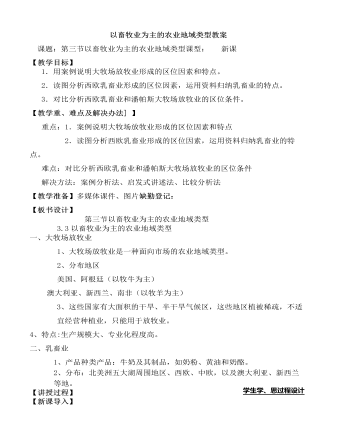
人教版高中地理必修2以畜牧业为主的农业地域类型教案
提问:阿根廷牧牛业以肉牛为主,那除肉牛以外还有哪种类型的牛呢?(奶牛)引入乳畜业。下面我们就来学习乳畜业。板书:二、乳畜业讲述:乳畜业随着城市发展而形成的面向城市市场的商品化、集约化畜牧业地域类型,其生产对像主要是奶牛。活动:请大家阅读52-53面内容,思考下列问题:提问:1、乳畜业产品有哪些?(牛奶及其制品)2、乳畜业主要分布在哪些地区呢?3、乳畜业是靠近消费市场好还是远离市场好?为什么?板书:1、产品种类产品:牛奶及其制品,如奶粉、黄油和奶酪。2、分布:北美洲五大湖周围地区、西欧、中欧,以及澳大利亚、新西兰等地。3、多紧邻消费市场(由于牛奶及大部分乳制品不耐贮藏,且运输不便)目前,世界上许多大城市都有奶牛农场分布于市郊。我国北京、上海等大城市周围也发展了乳畜业。活动:第53面及第54面的活动题。
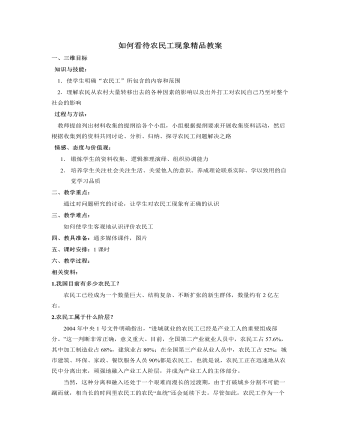
人教版高中地理必修2如何看待农民工现象精品教案
尽管如此,农民工作为一个新的社会阶层,其独特的经济需求和政治诉求应该得到充分的尊重。虽然农民工的“根”还在农村,但是他们已经脱胎换骨,日益成长为一个迫切需要社会认可的新兴阶层。3.农民工处于何种生存境况?作为“廉价劳动力”,工资水平低,拖欠时有发生。作为“超时劳动力”,工作时间极长,超负荷从事繁重工作。作为“高危劳动力”,社会保障缺失,各种安全事故频繁。4.农民工问题有多么重要?农民工问题关系到农业增效、农民增收和农村繁荣。农民工问题关系到工业化、城镇化和“以工补农、以城促乡”。农民工问题关系到社会主义和谐社会建设。5.解决农民工问题应该做些什么?构建城乡一体化就业体系。健全农民工权益保障制度。强化农民工输出地和输入地培训。稳妥解决农民工户籍问题。改进对农民工的管理和服务。
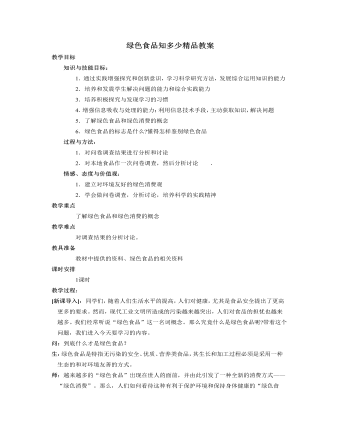
人教版高中地理必修2绿色食品知多少精品教案
生1:加强对绿色食品的宣传和扶持力度。当前的形势迫切要求我们发展绿色食品,因为绿色食品是真正实现可持续发展的,做到了发展经济和环境保护相结合,而且有利于增进人民身体健康。但目前绿色食品在市场上难成气候,主要是宣传和扶持不够。生2:绿色食品对环境、生长过程、加工过程以及运输等过程都有很严格的要求,很多环境相对优良的地区都是边远落后地区,必须给予政策上的扶持和优惠,才能降低成本,市场发展前景才会更加广阔。活动与探究对当地绿色食品市场情况作调查并初步分析。活动的实施过程:1.确定调查研究的目标并制定调查研究的计划。市场调查要深入广大消费者,可以去市场上做调查,‘对象包括消费者和经营者。形式可以是问卷,也可以是现场采访。弄清楚被调查者对绿色食品的态度,是否了解食用绿色食品的意义,是否懂得鉴别绿色食品等。对象力求涉及各个年龄段,多种职业。2.对问卷调查进行整理、分析,得出结论。
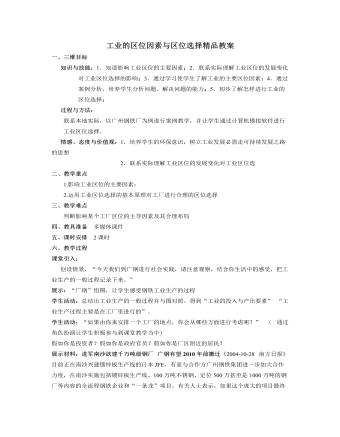
人教版高中地理必修2工业的区位因素与区位选择精品教案
思考:结合资料,看看“广钢”的搬迁还考虑到什么因素?主要从谁的角度去考虑?展示资料:广钢建于1958年,由于城市化进程的加快,原来地处偏僻的广钢一带现已成闹市,广钢因此给周边带来了许多不便,并屡被投诉,投诉的主要内容是烟气、粉尘超标。近日,《珠三角环境保护规划纲要(草案)》(以下简称《纲要》)正式提交省人大常委会审议,按照《纲要》要求,2010年前,广东省将关、停、并、转、迁位于城市中心区高能耗、重污染的工业企业。学生讨论:环保要素、政策要素……从市民、政府等社会角度去考虑板书:2、环保要素 3、政策的变化小结:影响工业区位选择的因素很多,不同的工业区位选择要考虑的主导因素可能是一个或几个,应因地制宜,具体分析。并且影响区位选择的因素随着社会的发展而变化;社会、环境需要对工业区位也有一定的影响力。所以工业区位选择是复杂的,应综合考虑各种因素,以取得最大的经济、社会、环境综合效益。学生活动:计算机模拟工业选址,看谁是最英明的决策者(通过实践应用让学生感受到工业的区位选择应综合考虑)
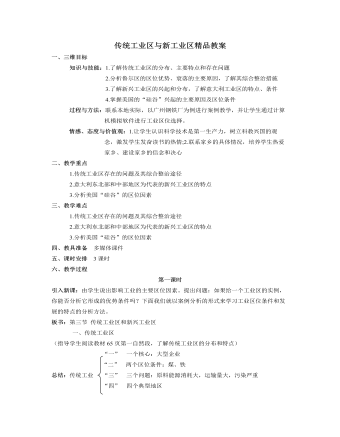
人教版高中地理必修2传统工业区与新工业区精品教案
③在萨斯索罗地区集聚的相关企业和服务性机构有哪些?④萨斯索罗瓷砖工业小区的生产—销售—服务网络中支撑企业、辅助性企业、服务性企业、服务性机构有哪些?学生回答问题后教师小结:意大利的新工业区,以中小企业集聚的工业小区为独特的发展模式。工业小区的优势是有助于加强专业化,提高生产效率,降低生产成本,增强在市场上的竞争力。完成课本70页活动:1. 比较温州乡镇企业与意大利新工业区的发展有什么异同(相同:有大批廉价劳动力,企业规模小,以轻工业为主,企业生产高度专业化,资本集中程度低。不同:最大的不同是意大利工业小区密切联系协作,共同形成巨型企业,温州虽生产同种产品,但是联系协作不如意,形成多家企业竞争局面,规模效应大减。)2. 温州乡镇企业的发展有哪些些问题?你能为其解决这些问题提出合理化的建议吗?(加大技术投入,企业间联系协作,杜绝恶性竞争等)
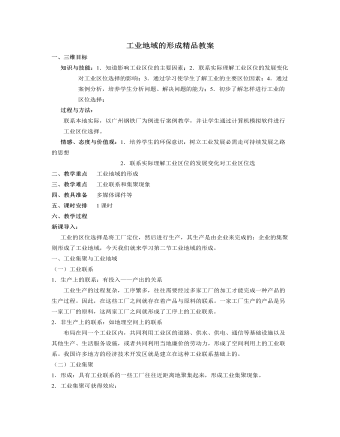
人教版高中地理必修2工业地域的形成精品教案
2.音响生产的工业集聚有哪些优势?点拨:可以加强各企业间的信息交流和技术协作,降低中间产品的运输费用和能源消耗,进而降低生产成本,提高生产效率和利润,取得规模效益。3.根据惠州音响零件的来源百分比,说明惠州音响零件供应厂家的地域分布有什么规律。点拨:距离递减规律,距离惠州音响整机组装厂越近的地区零件来源所占比例越高。三)工业地域工业联系—--------- 工业集聚------------工业地域工业地域:工业集聚而形成的地域称之为工业地域。1.工业地域形成的两种情况⑴自发形成的工业地域: 以生产工序上的工业联系为基础,以降低生产成本为目的。⑵规划建设的工业地域:如我国许多地方的经济技术开发区:①把生产上有投入 产出联系密切的工厂布局在一起。②先建成基础设施,再吸引投资者建厂,形成空间和信息共同利用的工业联系。我国许多地方的经济技术开发区,就是利用这一原理建成的。2.两类不同性质的工业地域
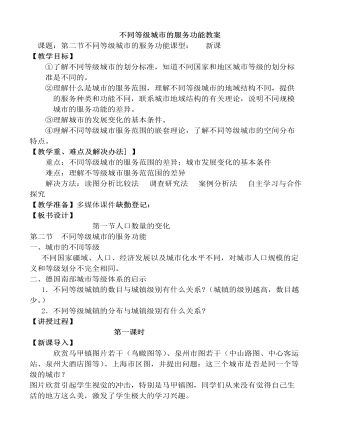
人教版高中地理必修2不同等级城市的服务功能教案
1、 前提条件:①环境几乎一样的平原地区,人口分布均匀2、 ②区域的运输条件一致,影响运输的惟一因素是距离。城市六边形服务范围形成过程。(理解)a.当某一货物的供应点只有少数几个时,为了避免竞争、获取最大利润,供应点的距离不会太近,它们的服务范围都是圆形的。 b.在利润的吸引下,不断有新的供应点出现,原有的服务范围会因此而缩小。这时,该货物的供应处于饱和。每个供应点的服务范围仍是圆形的,并彼此相切c.如果每个供应点的服务范围都是圆形相切却不重叠的话,圆与圆之间就会存在空白区。这里的消费者如果都选择最近的供应点来寻求服务的话,空白区又可以分割咸三部分,分别属于三个离其最近的供应点。[思考]①图2.15中城市有几个等级?②找出表示每一等级六边形服务范围的线条颜色?③叙述不同等级城市之间服务范围及其相互关系?3、理论基础:德国南部城市4、意义:运用这种理论来指导区域规划、城市建设和商业网点的布局。1、 应用——“荷兰圩田居民点的设置”。
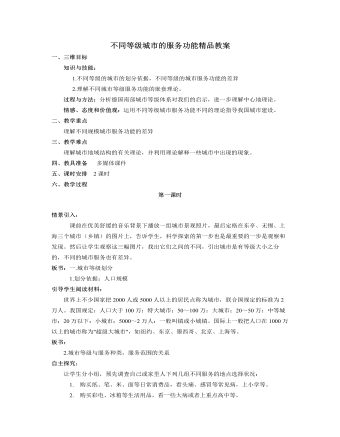
人教版高中地理必修2不同等级城市的服务功能精品教案
学生探究案例:找出不同等级城市的数目与城镇级别的关系、城镇的分布与城镇级别的关系并试着解释原因。在此基础上,指导学生一步步阅读书上的阅读材料,首先说明这是德国著名的经济地理学家克里斯泰勒对德国南部城市等级体系研究得出的中心地理论,他是在假设土壤肥力相等、资源分布均匀、没有边界的平原上,交通条件一致、消费者收入及需求一致、人们就近购买货物和服务的情况下得出的理想模式。然后指导学生阅读图2.14下文字说明,理解城市六边形服务范围形成过程。指导学生读图2.15,找出图中城市的等级、每一等级六边形服务范围并叙述不同等级城市之间服务范围及其相互关系,从而得出不同等级城市的空间分布规律,六边形服务范围,层层嵌套的理论模式。给出荷兰圩田空白图,让学生应用上面的理论规划设计居民点并说出理由,再和教材上的规划进行对照。然后给出长三角地区城市分布图和各城市人口数,让学生对这些城市进行分级,概括每一级城市的服务功能、统计每一等级城市的数目以及彼此间的平均距离,总结城市等级与服务范围、空间分布的关系?
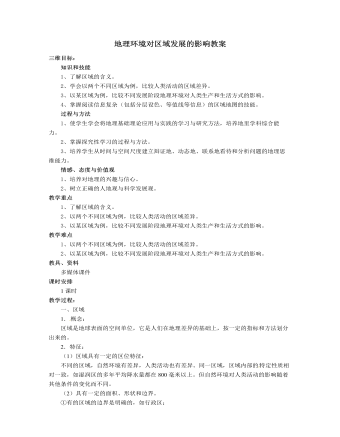
人教版高中地理必修3地理环境对区域发展的影响教案
(1)下面列出的是我国南北方传统民居的差异,分析形成这些差异的自然原因:——北方民居正南正北的方位观比南方强;——北方民居的墙体严实厚重,南方民居的墙体轻薄;——从北到南,民居的屋顶坡度逐渐增大,房檐逐渐加宽,房屋进深和高度逐渐加大。(2)下面列出的是我国南北方城市住宅搂的差异,分析导致这些差异的自然原因:——如果不考虑地价、建筑材料等因素,建同等面积的住房,北方的建筑成本比南方高 ;——建同样高度的多幢楼房,北方楼房的南北间距比南方大。点拨:本活动要求学生了解由于地理环境的差异造成南北方建筑物特点的不同,并由此认识地理环境 差异对人们生活的影响。(1)比较而言,北方的冬季寒冷而漫长,南方的夏季湿热而漫长。为了在冬季充分利用太阳光照和热量,北方民居正南正北的方位观比南方强。北方民居的墙体严实厚重,利用在冬季保温御寒;南方民居的墙体轻薄,利于在夏季通风透气。从北到南,年降水量逐渐增大,民居的屋顶坡度也逐渐增大(利于排水) ;随着对保温要求的降低和对通风纳凉要求的提高,民居的屋檐逐渐加宽,房屋进深和高度逐渐加大。





















